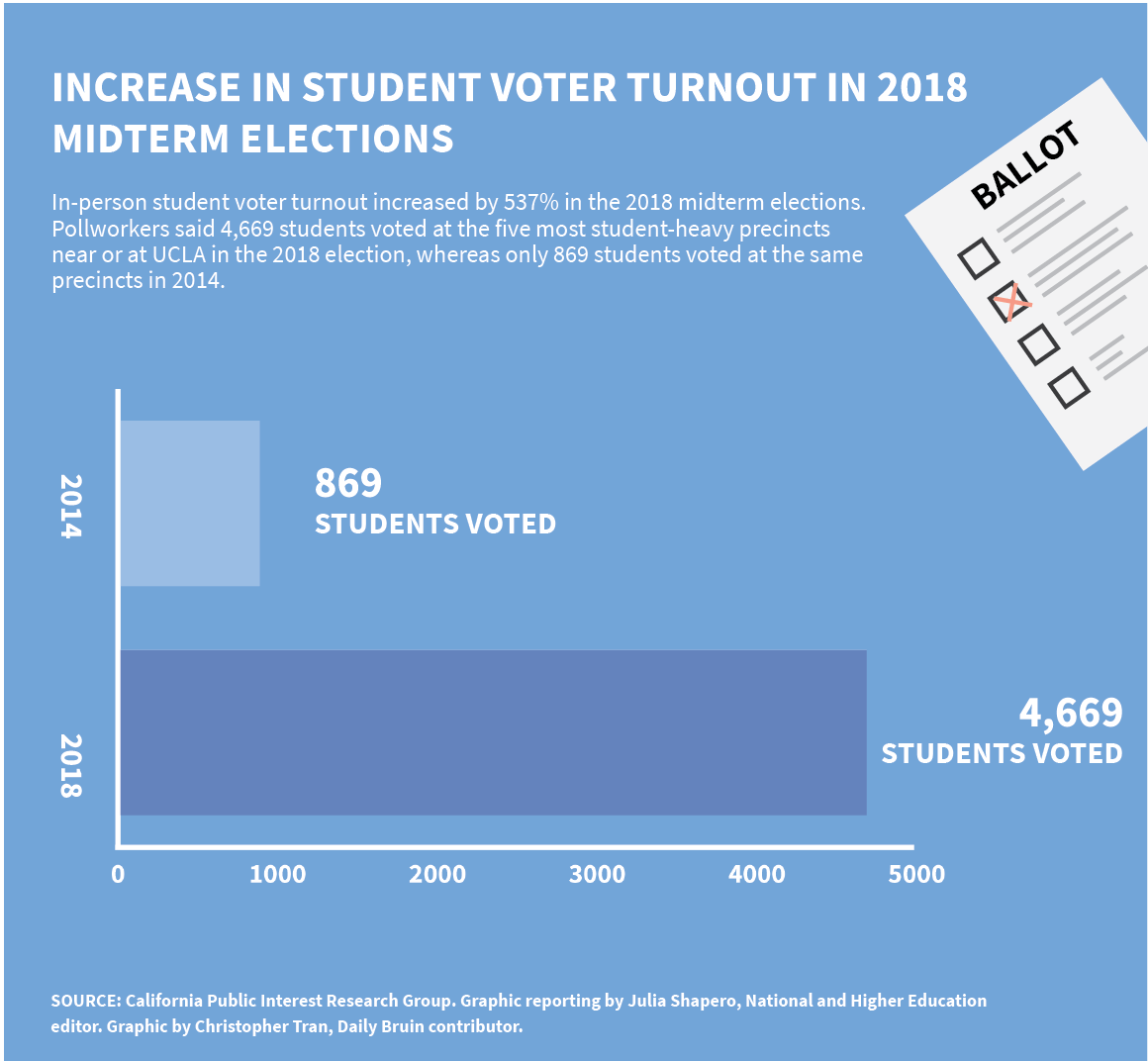Student participation in politics predicts more representative public policy

By Kalysa To
June 9, 2019 2:19 a.m.
UCLA students and faculty said they are hopeful more students will vote in the 2020 presidential election after an increase in student voter turnout for the 2018 midterm elections.
The 2018 midterm elections saw a 537% increase in in-person UCLA student voters in four years, from 869 students in the 2014 midterm elections to 4,669 students in 2018. Student organizations at UCLA, as a result, said they plan to continue their work of encouraging students to vote.
Sithara Menon, a second-year biology student and chair of the UCLA chapter of California Public Interest Research Group, said one of the effective tactics they used to encourage students to vote in 2018 was calling and texting with information about polling locations.
She said she thinks publicizing the information about the location and the hours of the student polling places made voting more accessible. CALPIRG at UCLA is working on getting a same-day voter registration site on campus to prevent confusion while registering or voting.
“There were a lot of students that we unfortunately had to turn away because they were registered in the wrong county or they thought that California voter registration laws meant that they could register at any polling place,” Menon said.
In addition to registering to vote, another barrier to overcome is the lack of value that students place on their individual votes, Menon said.
“Especially with our current political climate, there are a lot of people who just feel like it’s just not worth it to vote or feel like their vote doesn’t actually matter,” Menon said. “While one individual vote might not seem important as all of our voices together, that actually can make a huge impact.”
The Office of the External Vice President of the Undergraduate Students Association Council employed a variety of strategies to encourage students to vote in the 2018 midterm elections, said Jamie Kennerk, external vice president for the 2018-2019 school year and a fourth-year political science student.
Kennerk said while her office worked with classic strategies such as tabling and sending text reminders, they also partnered with Civic Nation, a grassroots organization, and MTV to put on a voter party outside the UCLA polling location, which she thinks encouraged more students to vote.
Kennerk added she hopes professors can help increase student voter turnout.
“Something that hopefully will be happening eventually is that we can … get a commitment from professors not to have midterms on Election Day because that’s honestly a pretty big barrier to students because it can … take a while to go vote,” Kennerk said.
Kennerk said she thinks students should vote in order to have a greater impact on elected officials.
“When young people are turning out in large numbers, elected officials are so much more receptive to us because now we are a major stakeholder in their constituency,” Kennerk said. “And so showing elected officials that young people are engaged is honestly the first step to getting any of our legislative priorities passed.”
Claudia Peña, a law lecturer at UCLA, said she thinks a major way to encourage students to vote is to use effective and appropriate methods of communication, such as innovative videos and comedy. She said using methods of communication that students are familiar with would make information more accessible to them.
“I think policy and work of the government, since it’s supposed to serve the people, should be accessible to every single person,” Peña said. “So talking about the issues in a way that’s accessible to everybody no matter what their background is, I think is really important.”
Peña said while she was excited by the increase of student voters in 2018, she wishes there would be higher turnout for smaller elections, like school board elections.
“We’re so focused on the big stuff that we miss a lot of the small stuff, so my hope would be that voting (on) something that happens every six months or every four years just becomes normalized,” Peña said.
[Related: USAC sees first independent president, lowest voter turnout in years]
Karin Wang, executive director of the David J. Epstein Program in Public Interest Law and Policy at the UCLA School of Law, said she thinks the increase in student voters in 2018 occurred because students felt they needed to make their voices heard.
Wang added the number of applicants to the Epstein program, a program founded on public interest-based work, has increased in recent years, perhaps for similar reasons.
“Students are charged up by this idea that they can contribute something to the direction of our country and they don’t necessarily like the direction it’s going in, so they’re invested in things like applying to public interest-based work, and I think that extends to voting,” Wang said.
Menon said she is optimistic for the future and she thinks students’ votes can impact society.
“Showing students that they can get involved in the political process and actually have an impact on the world they want to see for the future is really powerful,” Menon said. “If we have a democracy in which everyone votes and everyone’s voice is heard, then we will have a better world to live in, and that’s going to create a political system where we have politicians who really do represent us and listen to us.”


